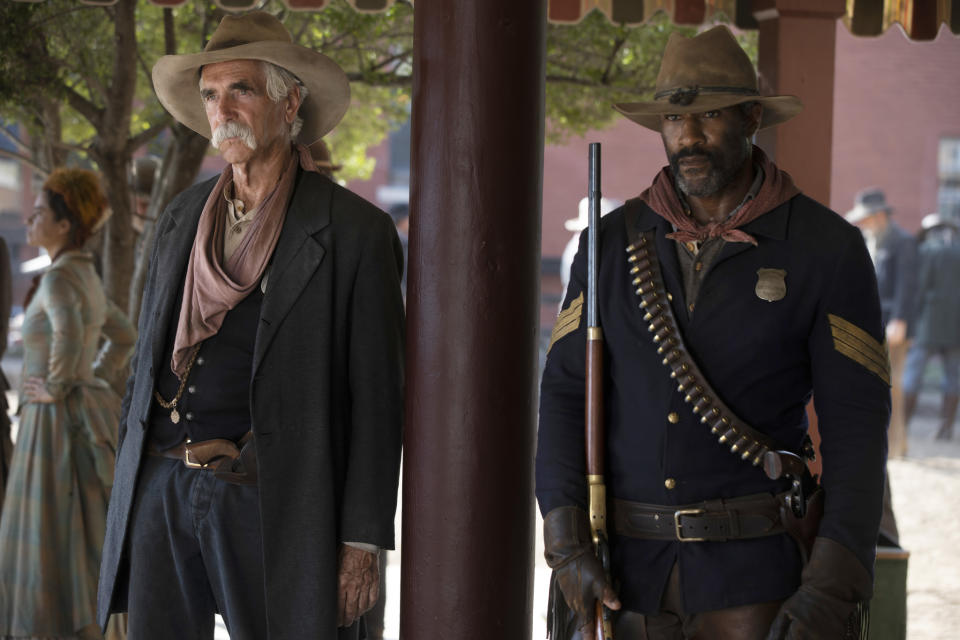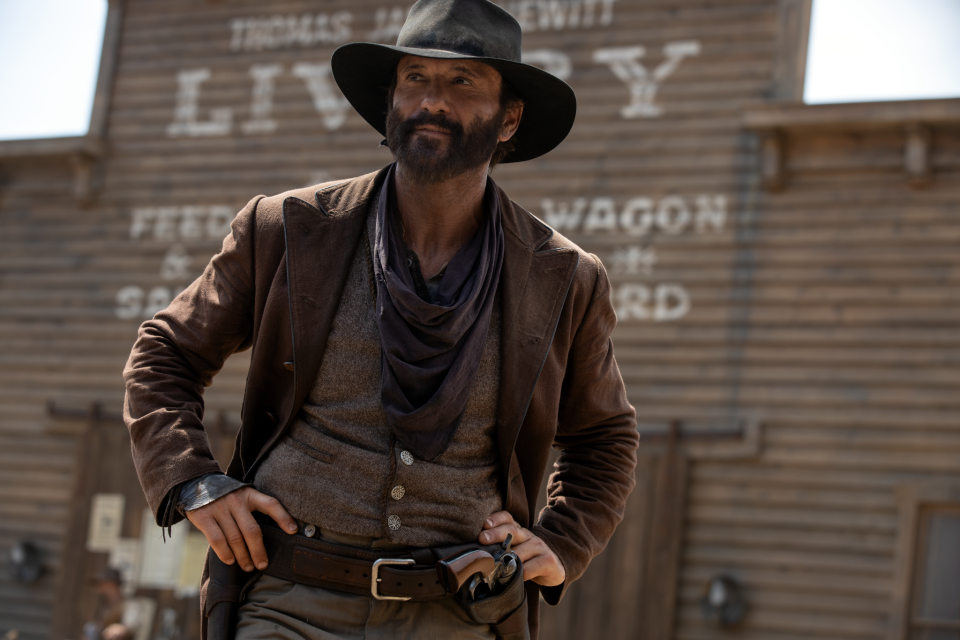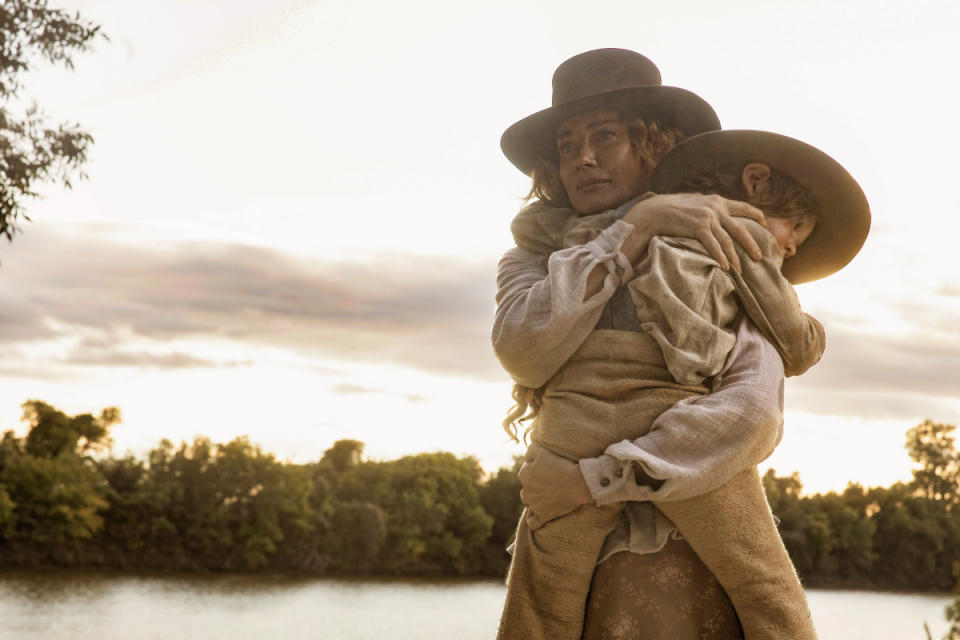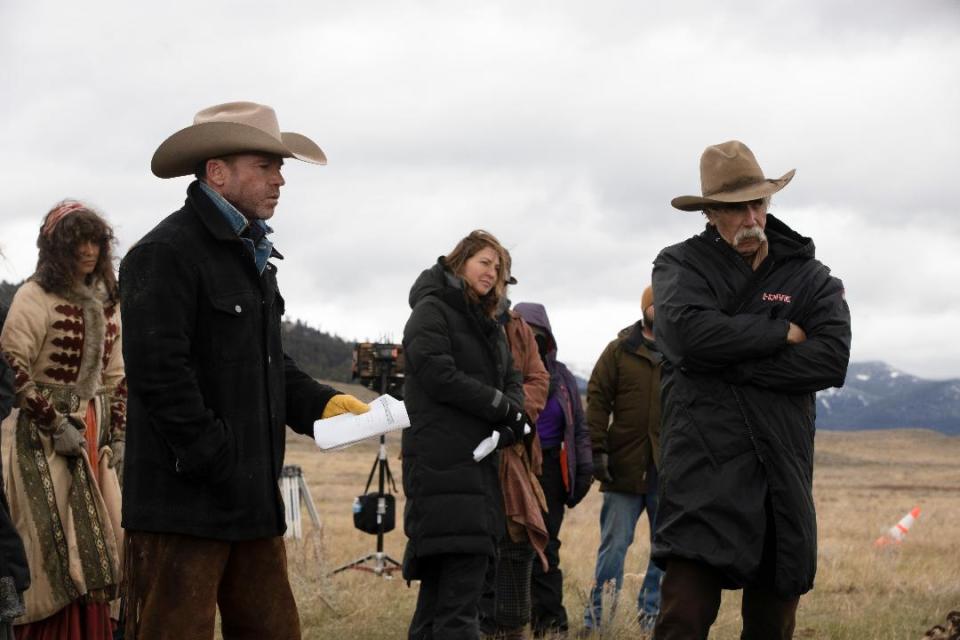Taylor Sheridan On ‘1883’ Finale: “We Wanted To Make A 10-Hour Movie With An Ending, And That’s What We Did”
- Oops!Something went wrong.Please try again later.
- Oops!Something went wrong.Please try again later.

SPOILER ALERT: This story contains details from Sunday’s Season 1 finale of Paramount+’s 1883.
Larry McMurtry was a literary inspiration for writer-director Taylor Sheridan, who took a page from the miniseries adaptation of that late author’s Lonesome Dove by scattering the harsh terrain with the bodies of its most beloved characters in the Paramount+ 101 Studios MTV Entertainment series. Sheridan’s 10-episode odyssey, about the push to Montana by the ancestors of Yellowstone‘s Dutton clan, saw the death of the show’s bright young narrator, Elsa Dutton (Isabel May), the grizzled Pinkerton agent Shea Brennan (Sam Elliott), and most of the European settlers who made the trip from Fort Worth, Texas in a ragtag wagon train caravan.
More from Deadline
'Grease: Rise Of The Pink Ladies' Adds Five To Supporting Cast Of Paramount+ Prequel Series
Paramount Stock Plunge Shows Perils Of Trying To Give Wall Street The Ol' Streaming Razzle-Dazzle
While there has been speculation of another season with this iteration of the Duttons once they arrived in Montana, a conversation that follows here with Sheridan that can only make you think, don’t hold your breath. He is only interested in picking up the Dutton story as a new cycle of shows taking place in the years of the Depression.
Sarah Coulter/ViacomCBS
The final 1883 episode, titled “This Is Not Your Heaven,” opens with the worsening of the wound suffered by Elsa. In steering away from her family the Lakota warriors hellbent on revenge for the murders of most of its tribe, Elsa took an arrow to the abdomen that pierced her liver and went right through her body. Even with the arrow removed, the trauma set a ticking death clock in motion — Lakota warriors dip their arrow tips in animal manure to causes fatal infections to the wearer — which could snuff out Elsa’s bright light forever. James (Tim McGraw) and Margaret Dutton (Faith Hill) began to come to grips with the knowledge that their spirited daughter probably will not survive. They’ve resolved to keep that news from their still optimistic daughter, and to settle and build their homestead wherever Elsa perishes. The young woman fights off the fever and blinding headaches, and is on horseback until she collapses when they reach a fort where hopefully a surgeon can help. There, the Duttons learn there is no surgeon, and that the fort has been taken over by the owners of the soon to be built railroad. Meaning, the young soldiers guarding it are colleagues of the badge-wearing deputies who massacred the Lakota campsite and stole their horses. And since those murderers were gunned down by Dutton, Shea and Thomas (LaMonica Garrett, who puts down one deputy with a short speech inspired by the one Clint Eastwood makes to Gene Hackman before sending him to hell in Unforgiven), they’d better exit the premises quickly or risk winding up on the wrong end of a hangman’s noose.
Says John Dutton to wife Margaret: “We can’t wait it out here. Ain’t no doctor can help her. Nobody can. And we ain’t gonna lay her to rest here. We keep heading North. Where she dies is where we stay. She’ll be with us. And you can visit her anytime you want.” Says Margaret, “Oh, I’ll be there, every day. Until you put me in the ground, right beside her.”
It is here that the ragtag fellowship of European settlers falls apart. Angered they are no longer going straight to Oregon — the Montana detour where Else can choose her final resting place is now the priority — the most vocal men among the settlers believe they can take it from here and dismiss the guides who got them this far. It is a fatal mistake that will play out as thieves ravage their unprotected encampment, later on. Only their translator Josef (Marc Rissmann) wants to stay with the Duttons. He is in desperate shape. His wife is near death in a coma, after a fall from a snake-bitten horse. Josef was bitten by the same rattler and his leg will have to come off before it kills him. Noemi (Gratiela Brancusi) volunteers to drive their wagon, and Thomas, now her lover and caretaker of her two children, will be the one to amputate Josef’s leg. And then there’s Shea, who is fearless but has been as dead inside as in the early moments of the first episode, when he lost his wife and daughter to smallpox, burned his family home to the ground, and nearly put a bullet in his brain before stopping to do this last job. He means to finish it and head to the seashore. It was his wife’s dream, and he believes the part of her he carries within himself will show it to her. She will see it through his eyes.
Sarah Coulter/ViacomCBS
All the while you’re thinking, Sheridan’s not really going to kill Elsa and Shea, is he? If you watched the Season 1 finale of Mayor of Kingstown, or many episodes of Yellowstone, or his movies from Sicario to Wind River and Hell or High Water, you might recall he has proven to be as unsparing and unsentimental storyteller as McMurtry and Cormac McCarthy. Death is always a main character.
That is why his 1883 scripts drew guest stars like Tom Hanks and Billy Bob Thornton. And there in the finale there is Graham Greene — best remembered from Dances with Wolves — in a small but key role as he happens upon the Duttons and tries to save Elsa with a cold-water plunge to stop the bleeding. While it only slows what is coming, the chief tells James Dutton where to go to bury his daughter and rebuild his life, pointing the way but with the caveat that seven generations up the road, his tribe will take back that land. From there, it becomes a race against sepsis and fever, and it is played out with high emotion and sadness. Particularly as Elsa realizes her father died when he told her she would recover. His sole focus becomes finding her final resting place, and they make that final trip alone. Before they go, Shea shares how much he misses his own daughter as he eulogizes James Dutton’s Elsa. “I’m 75 years old, and she has out-smiled me, out-loved me, outfought me. She has outlived me, she’s outlived all of us.” It is Shea who tells Margaret Dutton she will have to stay put while James races for that burial spot. And Shea’s last act takes place on a beach, where he carries out the suicide he contemplated in that early scene.
Here, Sheridan explains it all:
DEADLINE: Before the 1883 premiere, you told me what became an oft-repeated story, that you auditioned Isabel May for Mayor of Kingstown for the role of the broken woman Iris that went to Emma Laird. Even though she would be a new face, that meeting with May unlocked 1883 for you and a character who loses her innocence but never her spirit, embodying frontier dreams that drove those settlers. How close did her performance come to realizing what you imagined?
TAYLOR SHERIDAN: The greatest compliment you can pay an actor is to say they brought your imagination to life. That’s what she did. To me, she represents the innocence and hope that is unique to Americans and it has to do with the fact we’re such a young country. I wanted her to be that one vibrant thing, and never lose that as she became wiser through the journey. Even at the very end, she clings to it, she sees the world in color, through these dreamer eyes and they never quit dreaming. I wanted that beacon, whereas everyone else in the entire thing has experienced extreme hardship. At that period of time, you’re coming out of one of the darkest periods of our nation’s history. And that’s still so ingrained in everyone. And Sam did a version of that, as well.
DEADLINE: He is so perfectly cast in a Western. You are known for working with the same actors, again and again. Do you see yourself engaging again with May and Elliott?
Sarah Counter/ViacomCBS
SHERIDAN: Obviously, I would love that. She’s a remarkable actor, a generational talent, and I would love to find other things to do. Same with Sam. There’s an icon, someone I’ve admired my whole life, and to get a chance to work with him is a treat, just really special.
DEADLINE: I’m sure Paramount would love to continue the story of this iteration of the Duttons, with Tim McGraw and Faith Hill. But you told what felt like a complete story. Have you finished with this saga?
SHERIDAN: I created this peek through time to show you this one specific journey. I’m not someone who likes to tie everything up in a bow and explain how everyone lived happily after, or didn’t. I’d rather you imagine it, and wonder what Thomas and Noemi made of their lives. You never get to see how James and Margaret move on. You did seem them in a flashback as having moved on, and so that’s what I cared to explore. On to the next peek through the window. I also wanted to create something you could watch and be completely enthralled and fulfilled, having never seen Yellowstone. Let it live on its own merits. Yes for those fans of Yellowstone, there are some real Easter eggs and understanding you can take away from that, that informs the way you watch Yellowstone. I like that model. For me, as a storyteller it feels close ended. I’m going to peek through the window of a different era and see what I see then.
DEADLINE: So your interest is to move on to 1932, another Dutton family saga looking at a whole different period in the development of the family?
SHERIDAN: Yeah, peek through a different window into a different era. Again, I don’t think of any of these as spinoffs, but rather as complete stories that have common roots. My goal with the next one would be that you could never have seen 1883 or Yellowstone, and still have a fully realized experience as a viewer.
DEADLINE: So once again your killed the actor James Jordan. Starting with Wind River where he was the main villain, he’s been done in several times. In 1883, he was the cranky campsite cook who was done in by Lakota arrows.
SHERIDAN: James Jordan, he’s my pinch-hitter, when I need to kill somebody.
DEADLINE: Am I catching you at the SAG Awards, where your Yellowstone cast is up for Best Ensemble?
Sarah Coulter/ViacomCBS
SHERIDAN: No, I’m on my ranch.
DEADLINE: It feels like Yellowstone is turning that corner where a popular show starts to make its mark with the critics and awards voters. What does that SAG nomination mean to you?
SHERIDAN: That I’ve hired some of the most talented actors out there to bring these characters to life, and to see them be recognized is long overdue. I will say this, it took the coasts a bit to find this show, and once they found it, they’ve responded to the talent, the dedication of the actors. When you’re nominated for an award by any of your respective guilds, it’s the greatest honor you can receive. Because it’s your peers. It’s a lot of actors saying, that was really good acting. That means a lot to them, and it should.
DEADLINE: I’ve heard you’ve completed the acquisition of the Four Sixes, that vast working Texas cattle and horse breeding ranch where you shot much of 1883. What will be the first new thing you shoot there?
SHERIDAN: Well…let’s just say I now have a fair amount of ranching property in Texas. As for what we’ll shoot there, I have no idea, no clue, yet. I don’t like to talk about what I’m going to do. I’ll talk about what I did. If I talk about what I’m going to do, it locks me in. I could get another idea that will change my mind and I will want to do that.
DEADLINE: Okay, In the spirit of talking about what you just did, what was the most gratifying thing about completing this 1883 journey? You made a 10-episode, epic-sized Western in a compressed time period because Paramount needed it to launch its streaming service. There were Covid protocols to go with those crazy deadlines, and you built these wagon trains and the whole cast froze in Montana, before you finished on time on that Four Sixes ranch where I saw you.
Sarah Counter/ViacomCBS
SHERIDAN: That’s a pretty broad question. Typically, and most directors and showrunners will tell you the same thing…there’s what you want to do, what you can afford to do, and what you have time to do. I ignored the last two, and just did what I wanted to do. The network embraced it, or they got out of my way. Whatever way you want to look at it, they let me do it. It involved running multiple editorial teams, 24 hours a day, seven days a week. There were no weekends on this job, for anybody. I finished the edit, and was still tweaking the season finale of 1883 that you just watched, and finished Thursday. So, we came in under the wire. But we didn’t compromise. You always compromise whenever you are making anything. Time is your enemy and there are these factors you’re up against. Any filmmaker can tell you about some film critic going over their work, hitting them over the head because they said you should have done a scene like this, that or the other, and the filmmakers sit there with their heads in their hands, thinking, I wanted to do that. But they wouldn’t let me, or we couldn’t afford it. On this one, we filmed everything the way we wanted to film. When you have actors like these, who deliver the way they did, I could do one take and move on.
DEADLINE: Recently, the top Paramount execs had an investor day. On the Paramount+ part of it, there were a lot of continuing and new series coming from Taylor Sheridan. Can you handle all this? Are you overtaxed?
SHERIDAN: I’m grossly overtaxed. It’s impossible, what they’re asking for. But it was impossible what they asked for last year. I don’t know what else to say. But…the goal with 1883, I wanted to tell this really abstract odd structured story. If you were paying attention, I tell you exactly what was going to happen, in the first scene of the first episode [to Elsa and Shea]. And then hopefully made you fall in love with the world, and forget that stuff, and play with your expectations that there’s no way what I’ve already told you could actually happen. To play with structure that way, felt like a new rollercoaster ride for an audience, and hopefully a really reflective and beautiful one. We wanted to make a ten-hour movie that ended, and that’s what we did.
Best of Deadline
Cancellations/Renewals Scorecard: TV Shows Ended Or Continuing In 2021-22 Season
What's New On HBO Max For January 2022: Day-By-Day Listings For TV Shows & Movies
New On Prime Video For January 2022: Daily Listings For Streaming TV, Movies & More
Sign up for Deadline's Newsletter. For the latest news, follow us on Facebook, Twitter, and Instagram.






